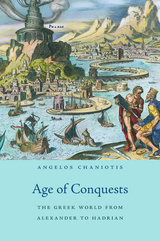
The world that Alexander remade in his lifetime was transformed once more by his death in 323 BCE. His successors reorganized Persian lands to create a new empire stretching from the eastern Mediterranean as far as present-day Afghanistan, while in Greece and Macedonia a fragile balance of power repeatedly dissolved into war. Then, from the late third century BCE to the end of the first, Rome’s military and diplomatic might successively dismantled these post-Alexandrian political structures, one by one.
During the Hellenistic period (c. 323–30 BCE), small polities struggled to retain the illusion of their identity and independence, in the face of violent antagonism among large states. With time, trade growth resumed and centers of intellectual and artistic achievement sprang up across a vast network, from Italy to Afghanistan and Russia to Ethiopia. But the death of Cleopatra in 30 BCE brought this Hellenistic moment to a close—or so the story goes.
In Angelos Chaniotis’s view, however, the Hellenistic world continued to Hadrian’s death in 138 CE. Not only did Hellenistic social structures survive the coming of Rome, Chaniotis shows, but social, economic, and cultural trends that were set in motion between the deaths of Alexander and Cleopatra intensified during this extended period. Age of Conquests provides a compelling narrative of the main events that shaped ancient civilization during five crucial centuries. Many of these developments—globalization, the rise of megacities, technological progress, religious diversity, and rational governance—have parallels in our world today.

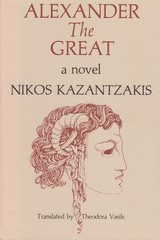
Nikos Kazantzakis is no stranger to the heroes of Greek antiquity. In this historical novel based on the life of Alexander the Great, Kazantzakis has drawn on both the rich tradition of Greek legend and the documented manuscripts from the archives of history to recreate an Alexander in all his many-faceted images—Alexander the god; Alexander the descendant of Heracles performing the twelve labors; Alexander the mystic, the daring visionary destined to carry out a divine mission; Alexander the flesh-and-blood mortal who, on occasion, is not above the common soldier’s brawling and drinking.
The novel, which resists the temptation to portray Alexander in the mantle of purely romantic legend, covers his life from age fifteen to his death at age thirty-two. It opens with Alexander’s first exploit, the taming of the horse, Bucephalas, and is seen in great part through the eyes of his young neighbor who eventually becomes an officer in his army and follows him on his campaign to conquer the world.
The book, which was written primarily as an educational adjunct for young readers, is intended for the adult mind as well, and like the legends of old, is entertaining as well as instructive for readers of all ages. It was originally published in Greece in serial form in 1940, and was republished in a complete volume in 1979.
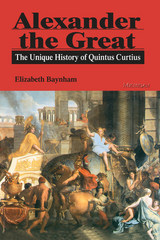
The reign and personality of Alexander the Great---one of the most romantic and powerful kings in history---have remained a source of fascination from antiquity to the present. But because the ancient information surrounding the conqueror is rich, contradictory, and complex, every historian of this near-mythical ruler-whether ancient or modern-invariably creates his or her own Alexander.
The unique work of one such ancient historian, Quintus Curtius, is the subject of Elizabeth Baynham's book. She mines Curtius' study of power for his contemporary perspective, historical methodology, and his portrait of the famous king and presents us with a brilliant, multifaceted study of this unique account regarding one of the most fascinating rulers in history.

On the march to greatness.
Arrian (Flavius Arrianus), of the period ca. AD 95–175, was a Greek historian and philosopher of Nicomedia in Bithynia. Both a Roman and an Athenian citizen, he was governor of the Roman province of Cappadocia 132–137, and repelled an invasion of the Alani in 134. He retired then to Athens (where he was archon in 148–149) and later to Nicomedia.
Arrian’s Anabasis of Alexander in seven books is the best account we have of Alexander’s adult life. Indica (a description of India and of Nearchus’ voyage therefrom) was to be a supplement.
A student of Epictetus, Arrian took notes at his lectures and published them (in eight books, of which we have four, The Discourses) and also the Encheiridion or Manual of Epictetus. Both works are available in the Loeb edition of Epictetus (LCL 131, 218).
The Loeb Classical Library edition of Arrian is in two volumes.

On the march to greatness.
Arrian (Flavius Arrianus), of the period ca. AD 95–175, was a Greek historian and philosopher of Nicomedia in Bithynia. Both a Roman and an Athenian citizen, he was governor of the Roman province of Cappadocia 132–137, and repelled an invasion of the Alani in 134. He retired then to Athens (where he was archon in 148–149) and later to Nicomedia.
Arrian’s Anabasis of Alexander in seven books is the best account we have of Alexander’s adult life. Indica (a description of India and of Nearchus’ voyage therefrom) was to be a supplement.
A student of Epictetus, Arrian took notes at his lectures and published them (in eight books, of which we have four, The Discourses) and also the Encheiridion or Manual of Epictetus. Both works are available in the Loeb edition of Epictetus (LCL 131, 218).
The Loeb Classical Library edition of Arrian is in two volumes.

The conquests of Alexander the Great transformed the Greek world into a complex of monarchies and vying powers, a vast sphere in which the Greek city-states struggled to survive. This is the compelling story of one city that despite long periods of subjugation persisted as a vital social entity throughout the Hellenistic age.
Christian Habicht narrates the history of Athens from its subjugation by the Macedonians in 338 B.C. to the battle of Actium in 31 B.C., when Octavian's defeat of Mark Antony paved the way for Roman dominion over the Hellenistic world. For nearly three centuries Athens strove unsuccessfully for sovereignty; its foreign policies were shaped by the dictates first of the Macedonian monarchy and later of the Roman republic. Yet the city never relinquished control of internal affairs, and citizen participation in its government remained strong. Habicht lucidly chronicles the democracy's setbacks and recoveries over these years as it formed and suffered the consequences of various alliances. He sketches its continuing role as a leader in intellectual life and the arts, as Menander and other Athenian playwrights saw their work produced throughout the Greek world; and the city's famous schools of philosophy, now including those of Zeno and Epicurus, remained a stellar attraction for students from around the Mediterranean. Habicht has long been in the forefront of research on Hellenistic Athens; in this authoritative yet eminently readable history he distills that research for all readers interested in the ancient Mediterranean world.
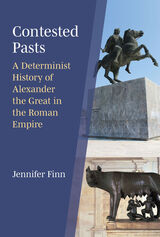
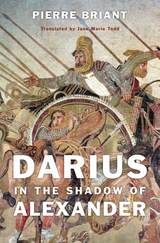
The last of Cyrus the Great’s dynastic inheritors and the legendary enemy of Alexander the Great, Darius III ruled over a Persian Empire that stretched from the Mediterranean to the Indus River. Yet, despite being the most powerful king of his time, Darius remains an obscure figure.
As Pierre Briant explains in the first book ever devoted to the historical memory of Darius III, the little that is known of him comes primarily from Greek and Roman sources, which often present him in an unflattering light, as a decadent Oriental who lacked the masculine virtues of his Western adversaries. Influenced by the Alexander Romance as they are, even the medieval Persian sources are not free of harsh prejudices against the king Dārā, whom they deemed deficient in the traditional kingly virtues. Ancient Classical accounts construct a man who is in every respect Alexander’s opposite—feeble-minded, militarily inept, addicted to pleasure, and vain. When Darius’s wife and children are captured by Alexander’s forces at the Battle of Issos, Darius is ready to ransom his entire kingdom to save them—a devoted husband and father, perhaps, but a weak king.
While Darius seems doomed to be a footnote in the chronicle of Alexander’s conquests, in one respect it is Darius who has the last laugh. For after Darius’s defeat in 331 BCE, Alexander is described by historians as becoming ever more like his vanquished opponent: a Darius-like sybarite prone to unmanly excess.
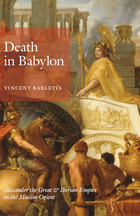
Though Alexander the Great lived more than seventeen centuries before the onset of Iberian expansion into Muslim Africa and Asia, he loomed large in the literature of late medieval and early modern Portugal and Spain. Exploring little-studied chronicles, chivalric romances, novels, travelogues, and crypto-Muslim texts, Vincent Barletta shows that the story of Alexander not only sowed the seeds of Iberian empire but foreshadowed the decline of Portuguese and Spanish influence in the centuries to come.
Death in Babylon depicts Alexander as a complex symbol of Western domination, immortality, dissolution, heroism, villainy, and death. But Barletta also shows that texts ostensibly celebrating the conqueror were haunted by failure. Examining literary and historical works in Aljamiado, Castilian, Catalan, Greek, Latin, and Portuguese, Death in Babylon develops a view of empire and modernity informed by the ethical metaphysics of French phenomenologist Emmanuel Levinas. A novel contribution to the literature of empire building, Death in Babylon provides a frame for the deep mortal anxiety that has infused and given shape to the spread of imperial Europe from its very beginning.
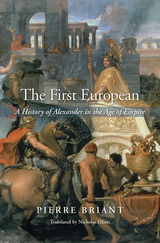
The exploits of Alexander the Great were so remarkable that for centuries after his death the Macedonian ruler seemed a figure more of legend than of history. Thinkers of the European Enlightenment, searching for ancient models to understand contemporary affairs, were the first to critically interpret Alexander’s achievements. As Pierre Briant shows, in the minds of eighteenth-century intellectuals and philosophes, Alexander was the first European: a successful creator of empire who opened the door to new sources of trade and scientific knowledge, and an enlightened leader who brought the fruits of Western civilization to an oppressed and backward “Orient.”
In France, Scotland, England, and Germany, Alexander the Great became an important point of reference in discourses from philosophy and history to political economy and geography. Voltaire, Montesquieu, and Robertson asked what lessons Alexander’s empire-building had to teach modern Europeans. They saw the ancient Macedonian as the embodiment of the rational and benevolent Western ruler, a historical model to be emulated as Western powers accelerated their colonial expansion into Asia, India, and the Middle East.
For a Europe that had to contend with the formidable Ottoman Empire, Alexander provided an important precedent as the conqueror who had brought great tyrants of the “Orient” to heel. As The First European makes clear, in the minds of Europe’s leading thinkers, Alexander was not an aggressive militarist but a civilizing force whose conquests revitalized Asian lands that had lain stagnant for centuries under the lash of despotic rulers.

Adventurous history.
Quintus Curtius was apparently a rhetorician who lived in the first century of the Roman empire and, early in the reign of Claudius (AD 41–54), wrote a history of Alexander the Great in ten books in clear and picturesque style for Latin readers. The first two books have not survived—our narrative begins with events in 333 BC—and there is material missing from books 5, 6, and 10. One of his main sources is Cleitarchus who, about 300 BC, had made Alexander’s career a matter of marvelous adventure.
Curtius is not a critical historian; and in his desire to entertain and to stress the personality of Alexander, he elaborates effective scenes, omits much that is important for history, and does not worry about chronology. But he does not invent things, except speeches and letters inserted into the narrative by traditional habit. “I copy more than I believe,” he says. Three features of his story are narrative of exciting experiences, development of a hero’s character, and a disposition to moralize. His history is one of the five extant works on which we rely for the career of Alexander the Great.
The Loeb Classical Library edition of Quintus Curtius is in two volumes.

Adventurous history.
Quintus Curtius was apparently a rhetorician who lived in the first century of the Roman empire and, early in the reign of Claudius (AD 41–54), wrote a history of Alexander the Great in ten books in clear and picturesque style for Latin readers. The first two books have not survived—our narrative begins with events in 333 BC—and there is material missing from books 5, 6, and 10. One of his main sources is Cleitarchus who, about 300 BC, had made Alexander’s career a matter of marvelous adventure.
Curtius is not a critical historian; and in his desire to entertain and to stress the personality of Alexander, he elaborates effective scenes, omits much that is important for history, and does not worry about chronology. But he does not invent things, except speeches and letters inserted into the narrative by traditional habit. “I copy more than I believe,” he says. Three features of his story are narrative of exciting experiences, development of a hero’s character, and a disposition to moralize. His history is one of the five extant works on which we rely for the career of Alexander the Great.
The Loeb Classical Library edition of Quintus Curtius is in two volumes.
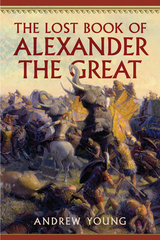
Alexander the Great is well known as one of the first great empire builders of the ancient world. Among those fellow Macedonian officers who accompanied Alexander in his epic conquests from Greece to India was Ptolemy Lagides. Ptolemy served alongside Alexander from the Persian defeat at the Battle of Issus in modern-day Turkey and the journey to find the oracle that proclaimed Alexander to be Zeus incarnate, to the Battle of the Hydaspes River in 326 BC that opened India to the West. Following Alexander’s death, Ptolemy gained control of Egypt where he founded the dynasty in his name, created the great library of Alexandria, and was patron of the mathematician Euclid. Sometime during his rule in Egypt, Ptolemy wrote a history of Alexander’s conquests. Although it is probable that Ptolemy enhanced his own importance, sources indicate that it was regarded as an accurate and even-handed account of the campaigns of Alexander. However, Ptolemy’s book was lost—perhaps with the destruction of the library he founded—and not even an original fragment has survived. His book, however, was acknowledged as a primary source of information for later Roman historians.
In The Lost Book of Alexander the Great, Andrew Young explores the world of ancient writings about the Macedonian leader in order to determine whether any of Ptolemy’s writings can be recovered. Inspired by Stephen Greenblatt’s distinguished biography of Shakespeare, Will in the World, and written for the general reader, the author uses literary forensics to suggest which parts of later books about Alexander the Great, most notably the account by Arrian of Nicomedia, might be the words of Ptolemy. In addition to separating later Roman sensibilities from the original Greek of Ptolemy, the author re-creates the famous library of Alexandria, and takes the reader along on Alexander’s conquests as closely as we can to how Ptolemy may have recounted them.
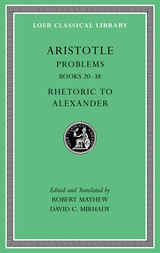
Peripatetic potpourri.
Aristotle of Stagirus (384–322 BC), the great Greek philosopher, researcher, logician, and scholar, studied with Plato at Athens and taught in the Academy (367–347). Subsequently he spent three years in Asia Minor at the court of his former pupil Hermeias, where he married Pythias, one of Hermeias’ relations. After some time at Mitylene, he was appointed in 343/2 by King Philip of Macedon to be tutor of his teen-aged son Alexander. After Philip’s death in 336, Aristotle became head of his own school (of “Peripatetics”), the Lyceum at Athens. Because of anti-Macedonian feeling there after Alexander’s death in 323, he withdrew to Chalcis in Euboea, where he died the following year.
Problems, the third-longest work in the Aristotelian corpus, contains thirty-eight books covering more than 900 problems about living things, meteorology, ethical and intellectual virtues, parts of the human body, and other topics. Although Problems is an accretion of multiple authorship over several centuries, it offers a fascinating technical view of Peripatetic method and thought. Both Problems, in two volumes, and Rhetoric to Alexander replace the earlier Loeb edition by Hett and Rackham, with texts and translations incorporating the latest scholarship.
READERS
Browse our collection.
PUBLISHERS
See BiblioVault's publisher services.
STUDENT SERVICES
Files for college accessibility offices.
UChicago Accessibility Resources
home | accessibility | search | about | contact us
BiblioVault ® 2001 - 2024
The University of Chicago Press









